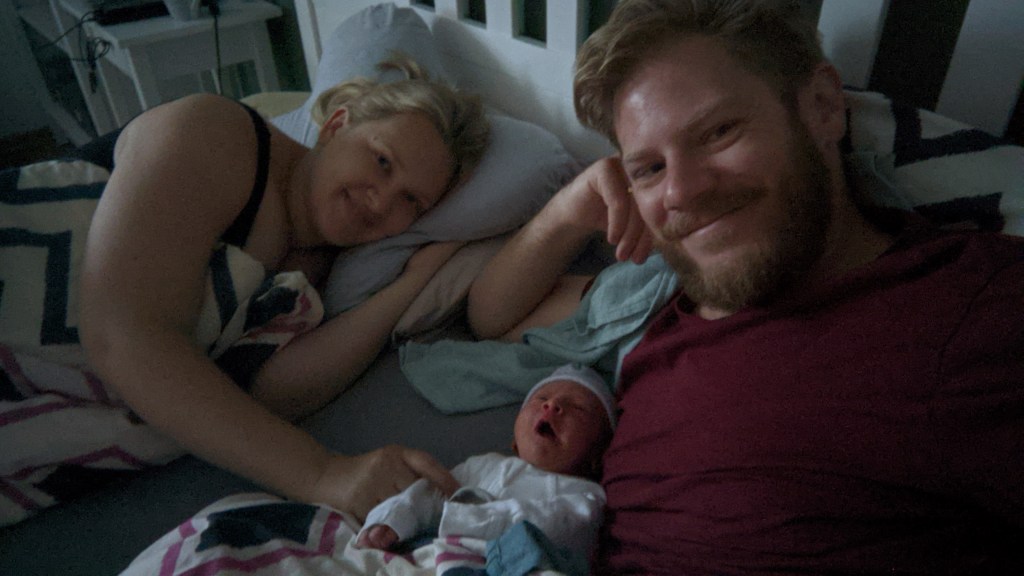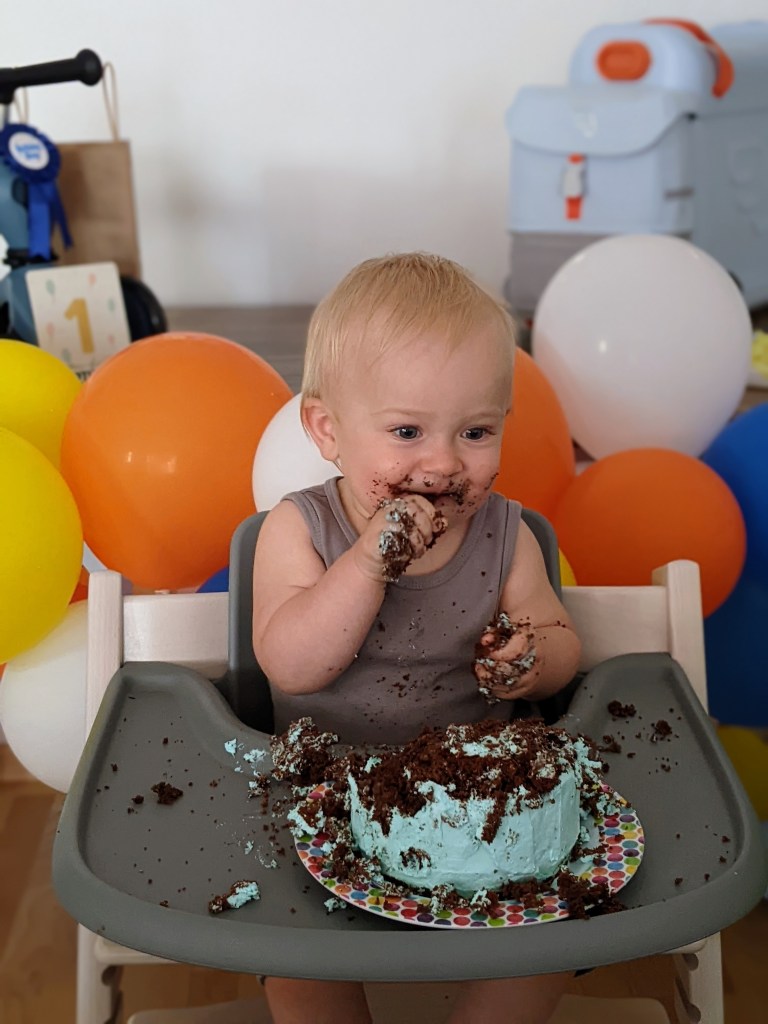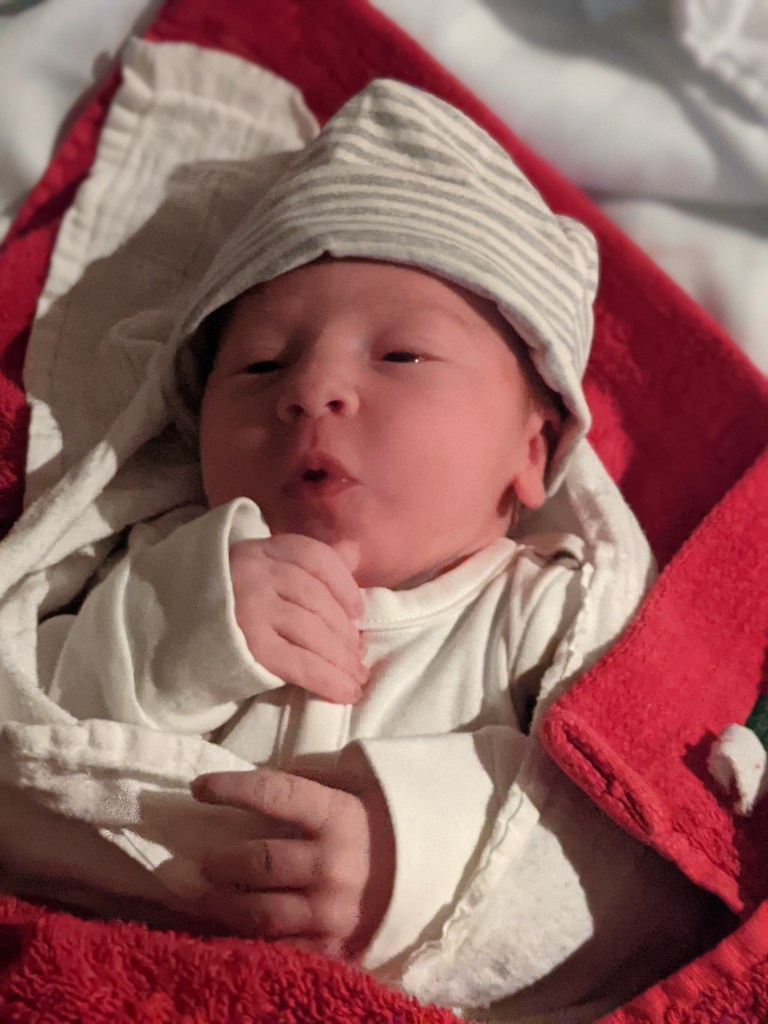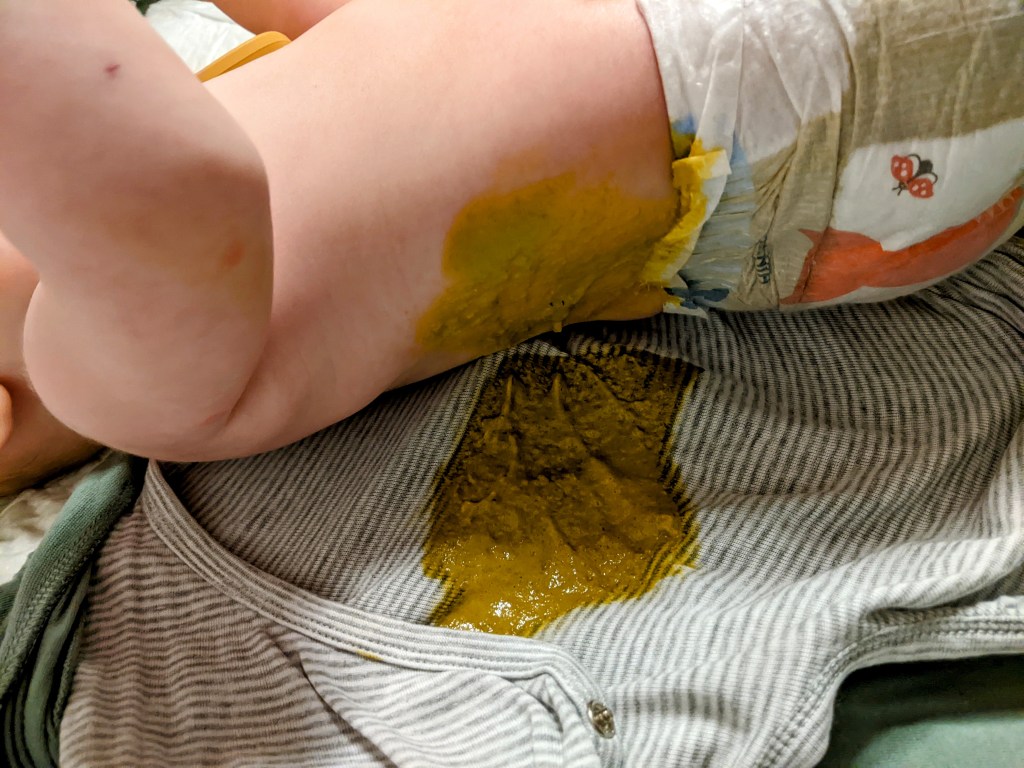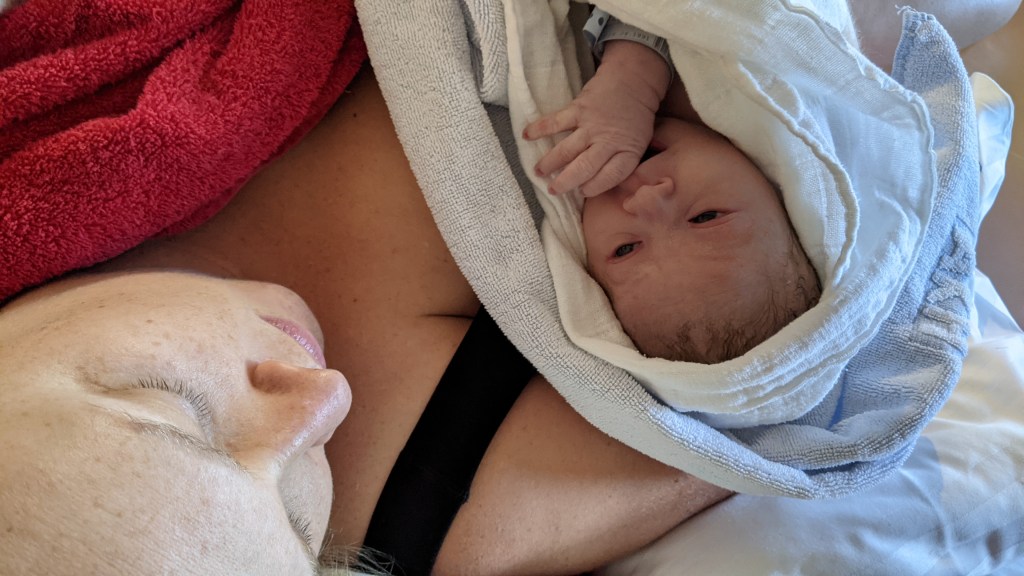…When the time for boarding finally came, Alex and I gave each other a quick pep-talk, sent a prayer to a god we don’t believe in, and strapped Roo to my chest in a baby carrier.
This setup kept him happy for all the time it took to queue, scan our tickets, and make our way to the crowded gangway where we immediately came to a halt while the slow procession of passengers crawled into the confines of the plane. Stuck in the overpopulated metal tube, Roo vented the frustration we were all feeling and began to cry. Thankfully, as previously mentioned, my wife is an organisational queen and within seconds of his first sooky croak she had a tupperware container full of snacks out and three rice crackers stuffed into his tiny fist. As is so often the case with all of us, food turned his mood upside down and he was soon happily munching away while making eyes at anyone who looked his way.
Boarding further fed his need for attention as we picked our way down the aisle through the seated passengers, who, in desperate need of anything to distract them from their immediate discomfort, found the image of a little person strapped to a big person’s chest greatly entertaining. We moved down the length of the plane in a wave of smiles, partners tapping each other to point out the toddler at chest-height, and assurances of Roo’s cuteness from little old ladies who gave his foot a squeeze in passing like a worshipper grazing the fingers of a tiny cult leader.
We seated ourselves and, after three years of flightless lockdown, the illusion of the joy of flying that we had held in our heads was shattered as we instantly recalled just how little legroom a passenger is allotted. The sense of claustrophobia was only amplified by the baby on our lap who, in some weird M.C. Escher twisting of space, also didn’t have enough leg room despite his legs being the length of cucumbers.
We were approached by a stewardess who provided a baby seatbelt and inquired if we were familiar with how it worked. I demonstrated through the carrier that I was well-versed in strapping my child to my body and we buckled Roo in, Alex’s turn this time, and then attempted to keep him that way and not squirming onto the young man who had the misfortune to be seated in the third seat of our row.
We idled on the tarmac and Alex and I got to work jiggling keys, pulling faces, singing songs, plucking out vomit bags from the seat pocket to play with, and pointing out everything and anything that might serve to hold Roo’s interest for longer than thirty seconds. We were the jesters to the young prince and this juggling of distractions kept his lordship happy up until the big moment: take off.
Demonstrating once again that she is a force of forethought, my wife had prepared what is essentially a porous pacifier full of fruit that forces the infant to chew and suck in order to get the tasty treat into their mouth, meaning that as we elevated and the pressure shifted, Roo’s jaw was working hard, thereby avoiding the pressure build up inside his ears. Our little man was smiling and satisfied the whole way up, entirely unaware that he had just risen to a cruising altitude of 35,000 feet.
Once we were up, we de-tensed a little, able to unbuckle our boy and pull out a tablet to mesmerise him with bright and colourful moving images. Roo climbed our bodies like ladders, peeking over our shoulders and some of the nearby passengers took over the load of providing entertainment, smiling and waving and falling under Roo’s cheeky spell.
Then the unthinkable, but what we prayed for to any god listening prior to boarding, happened. Roo leant back against me, Alex angling the tablet towards his eyeline, and he remained still. We held our breaths, equally as still as our son, and shared shocked glances as Roo’s eyelids drooped, and drooped further, then sprang open, then eased closed, and stayed that way. The patron saint of parents had answered our prayers and delivered up the holy grail of mid-flight transit possible scenarios – our baby slept.

Our natural instinct was to holler and high-five, but we managed to restrain ourselves and instead whispered words of praise and congratulations to each other. While they gave no sign of the momentous event that had just occurred, I’m sure our neighbouring passengers were silently sharing in the victory.
We spent the next thirty minutes grinning silently at each other and whispering how great we were at the whole parenting game while Roo dozed merrily on and we careened ever closer to Athens. My arm grew steadily more and more numb but I embraced the pins and needles, reasoning my limb was the sacrifice needed to appease the patron saints of parents and, if so, then it was a reasonable price to pay.
Then, from down the aisle, we spotted the trolley. The metal cart jangled and clanked as it was pushed down the narrow thoroughfare, the too-smiley stewardess behind it speaking bubbly and loudly over the roar of the engines. We scrambled for a polite way to indicate for her to leave us the hell alone but any attempt at deflection would have meant matching her in volume and so, instead, we smiled as she approached and begged her with our eyes to be quiet. She provided the lunch options for the flight in her loud, syrupy voice and we whispered our responses and tensed around our boy, as if somehow we could cocoon him from all disruptions through sheer exertion.
The stewardess eventually trundled on and both our sets of eyes darted over Roo’s face, which remained soft and doll-like and asleep. We sagged back into our seats, wiped the sweat from our brows, and inspected what food we’d ended up with. To begin with, we tucked the sandwiches away, afraid the crinkle of packaging would be our undoing, but hunger and a growing sense of daring pushed us towards testing the limits of this blessing and sampling just a bite.
Eventually we capitulated altogether and chewed merrily away on a surprisingly tasty hummus and sun-dried tomato sandwich while Roo continued to slumber across me.

After an hour in sleepland, his little head came up, hair in disarray, and we launched into long and detailed praises of what a wonderful boy he was as he blinked up at us before swatting at a vomit bag.
The captain announced the descent and we prepared for the final test of the journey. Alex had a second fruit pacifier ready and waiting, which at this point must come as no surprise to you, and so we descended as we ascended, with Roo chewing and slurping away and Alex and I acting nonchalant while tense from top to toes, ready for the re-pressurisation to kick in and our boy to transform into a howling monster.
Thankfully, with the assistance of further snacks, inflight magazines, and adjoining passengers who mouthed sweet nothings at Roo from across the cabin, we touched down without seeing the Mr Hyde to Roo’s happily babbling Dr Jeckell. We had a few impatient grunts while waiting for the torturously slow disembarking (with us in the middle of the aircraft, effectively putting us the end of two lines as passengers shuffled to either end of the plane) but they were coming from Alex and I as much as Roo, so we couldn’t really complain.
A crowded bus took us to the airport, Roo held in my arms but with him dutifully holding onto the pole for added security, and then we had done it. We were in Greece. The sunshine was hot, the terrain dry, and both us and our fellow commuters had arrived without our ears ringing from two hours of a screaming child. A miracle had occurred in the skies that day and we hugged our boy and informed him that he was, in fact, an angel.
This opinion wavered on the three-hour drive from the airport to our accommodation where, in the final hour, our angel decided he’d had enough, that he was snacked out, that a second nap was out of the question, that no cartoon, no matter how bright and idiotic, could hold his attention, that any attempts of comfort were unappreciated, and the only way to express himself was to cry at top volume with tears and snot decorating his face in ribbons.
Alex and I shared a look, shrugged, turned up the volume of the radio, and agreed that it was better that it was happening here, in the cabin of our car, with just us as an audience.
We arrived at our beautiful accommodation, our villa perched on the side of a hill with a view of the bay below us, exhausted, rung out, but essentially in one piece. Roo perked up once he was able to stretch his legs and made himself quite at home in the new digs, to the point that Alex and I almost could have believed the last hour was a shared delusion except for the tinnitus whining away just on the edge of our hearing.

We got Roo fed, dressed, and laid him in his crib, where, with some gentle encouragement, he finally succumbed to sleep, and then we called for some take away. We inhaled the gyros and chips on the terrace, the hummus and sun-dried tomato sandwich a distant memory, in view of our own private pool and with the lights of the bay blinking on, appreciating none of it and waiting only until we had digested enough to justify going to bed.
But when morning broke the next day, the sun painting the sky a rainbow of dusk colours and Roo waking at a time to ensure we could appreciate it, we reflected on the previous day’s success and sent out a final thanks to the patron saints of parents for having taken us into their fickle embrace.

We had done it, we had flown the two hours with a baby and had achieved the supreme victory of having had most of the other passengers oblivious to the fact that they had shared their journey with a pressure-sensitive bawling grenade.
We were able to replicate the experience on the return flight, complete with a mid-air nap, and Roo only crying in the final fifteen minutes as the pressure difference finally got to him and he became inconsolable. Thankfully this stopped the minute the pressure equalised and he returned to his previous activity of chowing down on a rusk stick.
In a week’s time we will once again take to the air and our new-found confidence will be put to the ultimate test. Rather than a two-hour jaunt across Europe, we will be flying to the planet’s southern hemisphere, to my home of Australia, a journey that takes two flights, a four-hour layover, and a total of twenty-four hours to complete.
Please pray for us and may the patron saint of parents have mercy on our souls.
Next week’s topic: The Fear that Comes With Fatherhood




